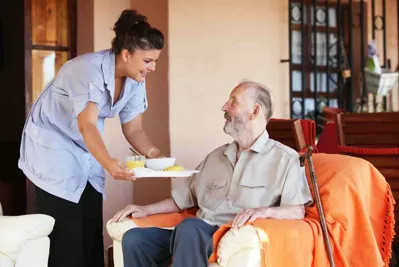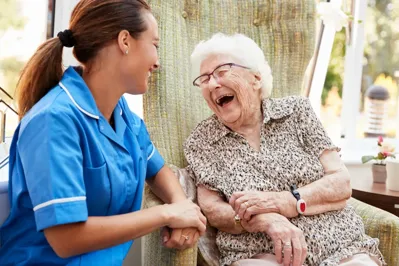In the United States, community home care has emerged as a valuable solution for ensuring that elderly individuals, often affectionately referred to as "old children," have meaningful companionship. Like children, many elderly adults seek companionship, social engagement, and activities to keep their minds and bodies active. Community home care services offer opportunities for the elderly to connect with caregivers or volunteers who can provide activities, conversation, and, importantly, companionship.
![]()
The Importance of Companionship for the Elderly
Just as children thrive on social interaction, elderly adults also benefit greatly from companionship. Studies show that social interaction can enhance cognitive health, decrease feelings of loneliness, and improve overall mental well-being. Community home care provides this companionship, allowing "old children" to stay socially engaged through shared activities such as chess, cards, reading, or simply chatting.
Having a companion can also improve their quality of life by reducing the risk of depression and anxiety, common issues faced by seniors living alone. Additionally, caregivers can offer physical assistance when needed, ensuring the elderly are not only mentally but also physically cared for. However, it’s essential to note that each elderly individual has a unique personality, and some may be more receptive to community care than others. Respecting their comfort level and willingness is crucial to ensure the best experience.
![]()
How Community Home Care Works
Community home care typically involves matching elderly adults with caregivers or volunteers within their area who offer personalized companionship services. These caregivers are often trained to handle the unique needs of seniors, including understanding age-related health issues, physical limitations, and communication nuances. Community home care services are usually part of larger organizations or local community centers that aim to enhance the quality of life for seniors in their area.
1.Activities and Social Engagement: Caregivers engage seniors in games, social activities, and conversations, creating a safe and enjoyable environment for elderly individuals to spend time. They may play board games, watch movies, take walks, or even help with light exercise if appropriate.
2.Practical Assistance: Besides companionship, many caregivers also offer practical support, such as helping with meal preparation, light housekeeping, or organizing medications. They serve as both companions and assistants, ensuring the senior's daily needs are met.
3.Regular Interaction: Community home care often involves scheduled visits that provide consistent support, whether daily, weekly, or on other intervals as requested by the family or the elderly person. This structure allows for ongoing companionship without causing a feeling of dependency or loss of autonomy.
![]()
Finding Community Home Care Services
Locating reputable community home care services can be simplified with online tools, local resources, and community organizations. Here are some ways to find suitable options:
- Online Directories: Websites like Caring.com, A Place for Mom, and ElderCare Locator provide detailed directories that allow users to search for home care services by zip code, read reviews, and view ratings. These platforms also allow families to find community home care providers tailored to specific needs and personalities.
- Local Community Centers and Senior Services: Many community centers offer senior-focused programs and may partner with local caregivers to provide affordable companionship options. Checking with these centers can help identify community care services nearby.
- Healthcare Providers and Social Workers: Many healthcare providers, particularly geriatric care specialists, can offer referrals for community home care services. Social workers are also familiar with local resources and can provide recommendations.
Equipment and Facilities Available in Community Home Care
The type of equipment and facilities provided through community home care vary, but most focus on comfort and convenience to ensure a positive environment for companionship. Typical facilities include:
- Comfortable Living Spaces: Whether services are provided in the senior’s home or a designated community center, spaces are designed for comfort, accessibility, and safety. If the service is based at a senior center, it may also include lounges, recreational areas, and quiet zones for relaxation.
- Activity Supplies: Caregivers or community centers often have board games, card games, puzzles, books, and other forms of entertainment that promote mental engagement and enjoyment.
- Safety Equipment: For elderly individuals with physical limitations, community home care services often have necessary safety equipment, such as walkers, grab bars, and wheelchairs. Caregivers may also be trained in basic first aid, ensuring that the senior’s safety is prioritized during their time together.
![]()
Cost of Community Home Care
The cost of community home care in the United States varies depending on the location, type of services, and frequency of visits. On average, companionship-focused services cost between $20 to $30 per hour. However, many community centers and nonprofit organizations offer lower-cost options or sliding-scale fees based on the individual’s income.
1.Hourly Rate: Most services are billed hourly, making it affordable for seniors who only need companionship for a few hours a day.
2.Long-Term Plans: For those who require consistent support, agencies or centers may offer packages that lower the hourly cost when booked for multiple hours or days per week.
3.Insurance and Financial Assistance: While Medicare typically does not cover home care services focused on companionship, some Medicaid programs and long-term care insurance policies may help cover costs if personal care is also included. Additionally, nonprofit organizations sometimes provide financial assistance or grants to help offset costs for low-income seniors.
Benefits of Community Home Care
Community home care offers multiple benefits to seniors, including mental and emotional health support, increased independence, and an improved quality of life. Here are some key advantages:
- Reduced Loneliness: Companionship reduces feelings of loneliness, helping seniors maintain a positive outlook.
- Encouragement of Independence: With the help of caregivers, seniors can stay in their homes or engage with their communities without needing to depend solely on family.
- Cognitive Engagement: Activities such as games, puzzles, and discussions help stimulate the brain, which can be beneficial for seniors at risk of cognitive decline.
![]()
Making the Decision
Community home care can be a life-enhancing choice for elderly individuals who enjoy social interaction. Families can start by discussing the option with their loved ones to gauge their interest and comfort level. It’s essential to keep the individual’s personality and preferences in mind, as some may welcome companionship more readily than others.
By providing a balance of independence and social support, community home care helps elderly individuals, or "old children," remain active, connected, and fulfilled. The personalized companionship approach not only enriches their daily lives but can be tailored to ensure each person receives the type of care they enjoy most


